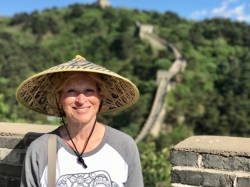Always Asking 'What's Next?'
PROVO, Utah – Oct 29, 2018 – Most universities don’t require professors to conduct ongoing research as well as manage a heavy class load—but BYU does—and it’s not easy. However, for Cindy Blair, her students are what make all the hard work worth it.
“BYU professors are different because we are invested in the success of our students.” Blair says. “We really love them and want them to do well.”
Blair believes in preparing her students with real-world application, so she strives to apply her experience in global supply chain to teaching and preparing her students with information she wishes she had known while working in the industry. Her favorite part of teaching is hearing her students tell her they are applying things they learned in her class to their careers. “That’s the real payoff,” she says.
Blair wasn’t always sure she wanted to teach, and her life has not gone the way she thought it would. However, she believes it’s gone according to God’s plan for her because when life was uncertain, Blair would ask, “What’s next?” and keep moving forward. This mentality shaped the course of her career and continues to inspire her teaching and research at BYU.
Blair received her undergraduate degree from BYU in accounting in 1989 and then served an LDS mission to Argentina. When she returned, she decided to go back to school for her MBA, which launched her into a career in purchasing at Intel. After eight years there, she felt the need to go back to school to get her PhD, which she received from Arizona State University. “I got my PhD at 40, which is kind of late, but you never know what life will bring,” Blair says. “Even though it wasn’t typical, it was right for me.”
From there she came to BYU where she has been teaching ever since. “It was never the plan, but I just kept asking myself—and God—what’s next?”
Teaching isn’t the end of Blair’s career; her next “what’s next” has been her research. She is now working with her colleagues to connect impoverished countries with valuable materials to the global supply chain. Countries that don’t know the value of their resources often sell them cheaply to businesses already connected to the supply chain. Blair wants to help people in this situation elevate themselves by cutting out the middle man, and connecting them to the chain directly.
“I always thought about getting involved in church humanitarian work after I retired,” she says. “But then I realized there is something I could be doing now.”
Blair shares her interest in other parts of global supply chain with her students on the annual GSCM study abroad. The trip takes them to visit every step of a supply chain in Asia, which helps the students gain a better idea of the types of people they will be interacting with when they are hired.
Having students who are excited and talented makes the hard work of teaching worthwhile.
“Our students in global supply chain management come to us already with a love for people beyond our borders. They embrace differences in other cultures, and that makes them easy to place,” Blair says. “They are such a bargain. You’re getting this mature, well-educated, well-qualified student, right out of undergrad. In other places, recruiters would have to find an MBA student to get the same quality.”
Media Contact: Chad Little (801) 422-1512
Writer: Katie Harris




